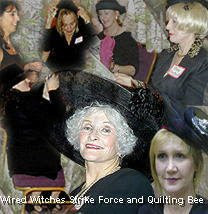
Dear Davidson College Professor Robert Chadwell Williams:
Your atom-spy book on KLaus Fuchs was my most recent read on the Manhattan project.
I started with general books on the Manhattan Project, then attacked the fat book on Oppenheimer, at length plowed through a tome that detailed Hoover's surveillance of Oppenheimer, including illegal wiretaps to satisfy Hoover's Communism fetish, read a couple of things on David Greenglass and the Rosenbergs, and finally finished your book, coming last because I thought the Klaus Fuchs' story would be tepid.
It's not. It's compelling because Fuchs's background and psyche made his espionage an outgrowth of his moral convictions, inherited from his admirable Quaker father. That Fuchs refused Russian money contrasts with Ames's wolfing down any that the Russians funneled to him while he demanded more. Ames was responsible for the deaths of 23 double agents.
Nor did Gold take any money from the Russians your book taught me, rather using his own meager funds to pay passage to meet Fuchs in New Mexico to pick up the information that Gold passed to his control in NYC.
These Manhattan Project books have indoctrinated me into the choreography of passing on data in information espionage--useful background if I want to break out of retirement one day and take up espionage.
The reason your name on the books' cover rang a bell was that I and other girls went to nurses' training in Charlotte and dated Davidson boys in the Fifties. The school's Web site says Davidson has had 23 Rhodes scholars and is in the upper ten percent of private liberal-arts colleges in the country.
Those data must mean you have a PBK chapter, which none of the boys we dated mentioned, likely because they weren't PBK members and also wanted no taint of intellectualism's diluting their alluring satyr images. We girls were not as dumb as Davidson's protosexists imagined us to be. We just pretended to be dumb in the Southern girls' age-old eiron strategy. We had to pass organic chemistry, so we were sharp enough not to have believed the Davidson boys thrust into the upward reaches of the Stanford Binet.
Any Davidson boy's reputation of intellectual éclat would have surprised us Mercy girls. Davidson gallants' forte lay in another direction: The Sisters of Mercy, who ran our school and had no mercy, warned us repeatedly to be on our guard against the Davidson boys, not for their scholarship but for their libido. I have found out fifty years later that the Davidson boys would have been delighted with that gloss.
I met a fellow in my beach condo on the elevator carrying a box down in departure ritual.
"Going home?" I asked.
"Yes ma'am," quoth he.
"Where bouts?" I inquired.
"Davidson, NC," he replied.
"Did you attend Davidson College?" I asked.
"Sure did," said he.
"We girls at Mercy Hospital used to date Davidson boys," I said, "and the sisters all warned us about them with the adage, 'Those wicked Davidson boys are interest in only one thing; so be on your guard.'"
This comment made the Davidson alumnus let out a whoop of delight. It echoed after him as he exited the elevator to the parking lot.
I could just picture his returning to Davidson and calling all his Davidson chums with the delightful information about Davidson boys' sex-fiend reputation of fifty years ago. I bet the Davidson satyr geezers strutted about with a renewed vigor that trumped their arthritic knees for weeks afterward.
The opening of your book puzzles. You don't give a reader a clue about its structure, so the reader has to wait until he or she has figured out the line of development by slogging through whatever number of pages it takes to grasp the book's shape.
The brand-new information you provided me was the British jealous goal of getting its own bomb, the urgency of which caused the British to enlist Fuchs when he returned to England from New Mexico because of his stellar theoretical physics genius and math mastery. The British eagerness to recruit Fuchs meant he did not get a close vetting by the M16 guys, whose agency it turned out was riddled with Soviet agents anyway.
Fuchs got only 14 years because of the British espionage laws while Gold in the US, who did infinitely less damage than Fuchs, got 28.
After reading all these Manhattan Project books, I have come away with a surprising grasp malgre lui of the innards of the atomic bomb and am about ready to take my state boards on heavy water, uranium 235, and uranium 238.
I also leave this Manhattan-Project reading adventure with the conviction that the US should have not dropped the bombs on Japan, which was about ready to surrender.
That decision by the dumb-as-a-stump Truman was what started the Arms Race, in which we all flounder as nation after nation gets nuclear power.
I am obliged to report that none of the Davidson boys who came over to the Mercy nursing students' dorm mentioned that the college had 38 Rhodes Scholars and was one of the ten top liberal-arts colleges in the United States.
My guess is that the rascals would have feared that circumstance if passed to the Mercy girls would have diluted their reputation as undergraduate satyrists.
Lee Drury De Cesare Mercy Hospital Class of '54 15316 Gulf Boulevard 802
Madeira Beach, FL 33708 tdecesar@tampabay.rr.com
cc: Therese Browne Abrahamson, Mercy Hospital Class of '54

No comments:
Post a Comment